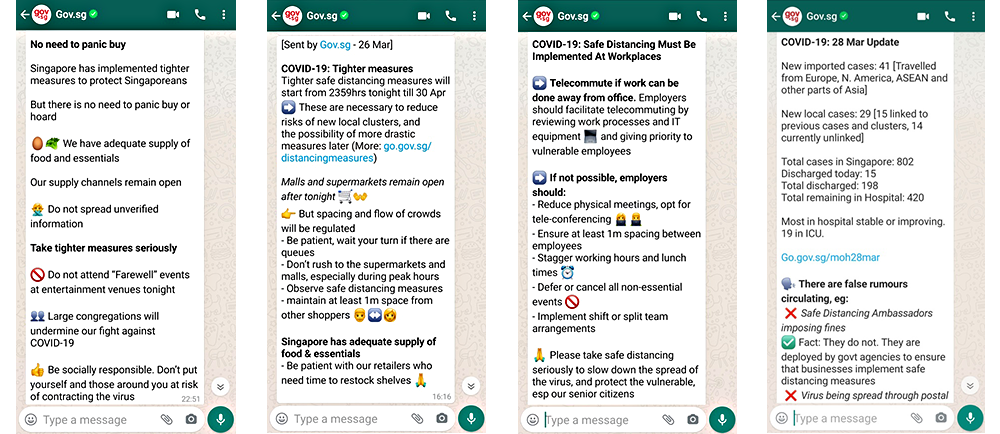Some countries have succeeded in containing the spread of the virus and are, for the moment, cited as examples for their good management of the crisis. Among them, the state city of Singapore has been able to take rapid measures and limit the number of patients in its borders, despite its proximity to China.
I spent a few weeks in Singapore during the start of the epidemic, and I saw that technology is being used very effectively by the authorities to prevent, identify, manage and monitor those affected to minimize the contagion in the society.
With only a few weeks' experience, I do not have the legitimacy to detail all the technologies currently used in Singapore to fight this epidemic. Instead I decided to interview my Singaporean colleague, Spike Choo, Technology and Innovation specialist at Orange Business. With his help, we can learn how technology has been applied in Singapore. This is not an exhaustive list, and it only highlights the situation as Spike and I understand it to date. We sincerely hope that if the situation changes, it will only be for the better.
Guillaume Baley: Hello Spike. Can you start by telling us what your mission is at Orange Business in Asia Pacific and how you work with local companies for their digital transformation?
Spike Choo: Hello Guillaume. Thank you for inviting me to share more about the Asia Pacific (APAC) business landscape and our digital consulting offerings.
Our team’s key mission is to support our APAC clients in their digital transformation journey. This means helping them to define their business pain points and challenges into clear problem statements, and working with internal Orange Business Business Units, Orange affiliates (e.g., Orange Labs, Orange Fab, etc.) and external partners to identify the right digital solutions to solve these problems.
GB: Can you describe how things have been evolving the last few weeks? What is the current situation in Singapore? What should we expect in the future?
SC: The COVID-19 situation in Singapore is still evolving day by day. Early in the fight, the Singapore government was able to contain the outbreak of domestic transmission through aggressive pre-emptive measures, such as offering free testing, free medical treatment and income subsidies to encourage and convince people who are sick to get tested. Once the patients are identified, the government immediately isolates these patients and uses contact tracing to identify other potential patients. These potential patients are served with a 14-day “Stay Home Notice (SHN)” and are monitored daily via their smartphones using a mix of GPS tracking, video and voice calls, and submitting digital photos of their surroundings in real time. Anyone caught disobeying the quarantine orders can be fined, jailed or expelled from the country.
In the past week, as the epicenter of the virus spreads to Europe and the U.S., we are seeing an increasing number of imported cases from Singaporeans and expatriates returning from the U.S., UK, Europe and other Asia countries. To combat this new trend, the Singapore government has implemented additional measures by enforcing compulsory quarantine for all incoming travelers and introducing stiff penalties for businesses and individuals caught contravening safe distancing rules in all public spaces. They rolled out a new mobile Bluetooth application to enable more efficient contact tracing.
Singapore authorities have been trying hard to avoid a full lockdown of the country, but more drastic measures may have to be introduced if the daily number of unlinked domestic transmission cases continues to increase.
GB: Once identified, people will be confined or hospitalized. All of the people that they have been around must also be identified in order to be quarantined. How can the movement and interactions of people be effectively monitored?
SC: The Singapore government hires external security firms to conduct checks on persons served with Stay Home Notices (SHN). The checks can take various forms including but not limited to the following:
- Random phone calls and requests for SHN users to submit videos or photos of their surroundings upon receiving the calls
- SMS with a link containing a GPS location request. SHN users must click on the link within 60 minutes of receiving the request
- Impromptu house visits and spot checks
Users who are suspected of flouting the SHN can be further investigated by reviewing mobile phone logs and tapping surveillance video cameras. There are already several cases of expats who have had their work permit revoked and were expelled from the country for breaching the SHN, while a local citizen had his passport revoked after breaking the SHN law.
GB: Are there also technologies to prevent person-to-person contamination, in addition to masks and sanitizer?
SC: Ultraviolet light has been tested and used successfully on both SARS and MERS, so it’s not unreasonable to expect that it will have a similar effect on COVID-19. There are currently UV-equipped robots to disinfect public locations, confined spaces and even accessories such as face masks. However, as yet there are no technologies or devices available that can disinfect an inhabited public space in real time.
GB: When people are in quarantine or confinement at home, can you know if they have left their homes? Using, say connected locks for example?
SC: People in confinement or quarantine are not locked up in their rooms, as this could pose a danger in the event of a fire or emergency. In most cases, SHN users are either confined in their own homes or at specially converted hostels, hotels and holiday chalets.
GB: From a European point of view, these measures and technologies seem extremely intrusive, and if misused, could be detrimental to the freedom of individuals. How do people perceive this in Singapore?
SC: The Singapore government has done a great job communicating the need to use such technologies to ensure that people comply with the SHN. They have been very transparent in sharing how the technology works, assuring the public that only basic information is collected, and they have been clear on how it will be used.
GB: Do you have an equivalent of GDPR in Singapore?
SC: Yes, we have the Personal Data Protection Act (PDPA) that comprises various rules governing the collection, use, disclosure and care of personal data by organizations. It recognizes both the rights of individuals to protect their personal data, including rights of access and correction, and the needs of organizations to collect, use or disclose personal data for legitimate and reasonable purposes.
Part of the PDPA Act includes setting up and operating a national Do Not Call (DNC) Registry. The DNC Registry allows individuals to register their Singapore telephone numbers to opt out of receiving marketing phone calls, mobile text messages, such as SMS or MMS, and faxes from organizations.
GB: During my stay I was also surprised by the clarity of the Singaporean government's communication. Can you describe what communication mechanisms have been put in place to inform the population?
SC: The Singapore government set up a dedicated WhatsApp channel for full transparency, open to anyone residing in Singapore, to instill confidence and inform everyone about any new measures being rolled out, as quickly as possible.
So far, this has included:
- Daily tally of new infections, total infections and number discharged and remaining in hospitals
- Messages to dispel rumors, fake news and scams
- Ongoing reminders of safety tips and new measures to be implemented, with dates of when they are due to be enforced
- Tips, support and information for locals to help them face a variety of challenges

GB: Last but not least, we have detailed how technology can prevent the spread of the virus by identifying and managing affected individuals. But can technology also cure people?
We know that many countries are working towards a cure and a vaccine for COVID-19. The Singapore’s medical R&D team has chosen to focus its attention on developing a rapid test kit that can detect if a person has COVID-19 in about five minutes. The test kit works by checking for the virus’s genetic footprint in the nasal swab collected from the user to be tested. This test kit is currently being reviewed by health authorities and, once approved, will be the fastest screening test for COVID-19 in the world.
We believe that once more people are able to get tested quickly and cost effectively, it will become easier for authorities to identify, isolate and monitor these people before they can spread the virus to others. This will help to reduce the domestic transmission rate.

I am a Senior Consultant at Orange Consulting in charge of web listening and business intelligence. My main mission is to help companies make information a strategic lever. My projects and my daily experience help me hone my skills in areas such as Data Governance, Artificial Intelligence, and Innovation via start-ups.